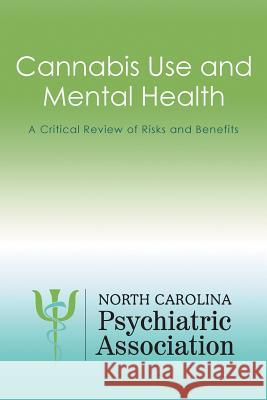Cannabis Use and Mental Health: A Critical Review of Risks and Benefits » książka
Cannabis Use and Mental Health: A Critical Review of Risks and Benefits
ISBN-13: 9781524569709 / Angielski / Miękka / 2017 / 114 str.
Cannabis Use and Mental Health: A Critical Review of Risks and Benefits
ISBN-13: 9781524569709 / Angielski / Miękka / 2017 / 114 str.
(netto: 87,30 VAT: 5%)
Najniższa cena z 30 dni: 90,42
ok. 16-18 dni roboczych.
Darmowa dostawa!
Several recent public opinion polls support the observation that attitudes toward the legalization of botanical cannabis products have changed dramatically over the past decade. Five jurisdictions in the United States have passed legislation decriminalizing use of small amounts of marijuana. Today, twenty-three states support use of some form of medical marijuana. As the first state to legalize marijuana, Colorado has witnessed the sale of over 1 billion dollars of marijuana products in the most recent year. The State of Colorado collected $135 million in tax revenue from these sales. Since public attitudes toward liberalization are more pervasive among younger voters, it seems inevitable that the momentum for further relaxation of restrictions on marijuana will continue. Concurrently, prevalence of use of marijuana has doubled over the decade from 2002-2013.Public policy decisions relating to this phenomenon are complex and include implications for all institutions of society from law enforcement to public health and health care delivery. Constructive public debate about the pros and cons of liberalization must be informed by an understanding of what science has learned about the risks and benefits to health in different population groups. On September 21, 2015, the American Society of Addiction Medicine (ASAM) issued a new policy statement on marijuana, cannabinoids, and legalization that favors a more balanced response to legalization efforts.This monograph, conceived and written by psychiatrist members of the North Carolina Psychiatric Association and supported by the Psychiatric Foundation of North Carolina, is intended to meet the need for a summary statement of what is known from scientific research efforts about the effects of use of cannabis products on the mental health of those who are using at varying ages and levels of vulnerability.
Several recent public opinion polls support the observation that attitudes toward the legalization of botanical cannabis products have changed dramatically over the past decade. Five jurisdictions in the United States have passed legislation decriminalizing use of small amounts of marijuana. Today, twenty-three states support use of some form of medical marijuana. As the first state to legalize marijuana, Colorado has witnessed the sale of over 1 billion dollars of marijuana products in the most recent year. The State of Colorado collected $135 million in tax revenue from these sales. Since public attitudes toward liberalization are more pervasive among younger voters, it seems inevitable that the momentum for further relaxation of restrictions on marijuana will continue. Concurrently, prevalence of use of marijuana has doubled over the decade from 2002–2013.Public policy decisions relating to this phenomenon are complex and include implications for all institutions of society from law enforcement to public health and health care delivery. Constructive public debate about the pros and cons of liberalization must be informed by an understanding of what science has learned about the risks and benefits to health in different population groups. On September 21, 2015, the American Society of Addiction Medicine (ASAM) issued a new policy statement on marijuana, cannabinoids, and legalization that favors a more balanced response to legalization efforts.This monograph, conceived and written by psychiatrist members of the North Carolina Psychiatric Association and supported by the Psychiatric Foundation of North Carolina, is intended to meet the need for a summary statement of what is known from scientific research efforts about the effects of use of cannabis products on the mental health of those who are using at varying ages and levels of vulnerability.











